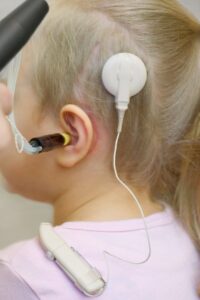Para leer esta página en Español, seleccione aquí.
What mechanisms of change drive vocal development?
 What are the relative contributions of internal (auditory) and external (social) feedback to early vocal development? Many studies have focused on the effects of auditory experience on infants’ early vocalizations – babbling – but the influence of social cues on vocal development has received relatively little attention despite the fact that vocal development can be guided by social feedback. Social reinforcement by caregivers that is contingent on babbling facilitates the development of more mature speech-like utterances, and more mature babbling sounds uttered by infants evoke greater social feedback from parents.
What are the relative contributions of internal (auditory) and external (social) feedback to early vocal development? Many studies have focused on the effects of auditory experience on infants’ early vocalizations – babbling – but the influence of social cues on vocal development has received relatively little attention despite the fact that vocal development can be guided by social feedback. Social reinforcement by caregivers that is contingent on babbling facilitates the development of more mature speech-like utterances, and more mature babbling sounds uttered by infants evoke greater social feedback from parents.
Babbling sounds made by infants elicit responses from parents – this interaction begins a social feedback loop: parents tend to respond more to speech-like sounds made by infants, and these predictable social reactions provide opportunities for infant learning. We are investigating how the acoustic characteristics of infant vocalizations influence parental responsiveness. Previous work has shown that infants monitor the effects of their behaviors, and modify their vocalizations in accordance with the phonological structure present in their parents’ utterances. In this way, early vocalizations contribute to a social feedback loop in which parents’ reactions reinforce speech-like babbling.

How does hearing loss impact the social feedback loop?
The impact of infant hearing loss has never been studied with regard to the social feedback loop. Infants born with hearing loss may have less auditory experience as well as less social experience. Social interactions between parents and infants with significant hearing loss are likely to be different relative to those of infants with typical hearing. The reduction of social feedback to babbling vocalizations, either by reduced parental responses or by infants’ lessened ability to perceive those responses, is likely to exert effects on learning and development of speech.
The impact of hearing restoration on the social feedback loop is also not known. Restoring hearing via hearing aids or cochlear implants improves auditory perception but does not remediate lost social learning opportunities or provide knowledge of how to learn from social partners. Data addressing social dynamics and vocal learning in infants before and after remediation of hearing are essential for a better understanding of speech acquisition, and for developing effective training regimens that promote the development of speech and language.